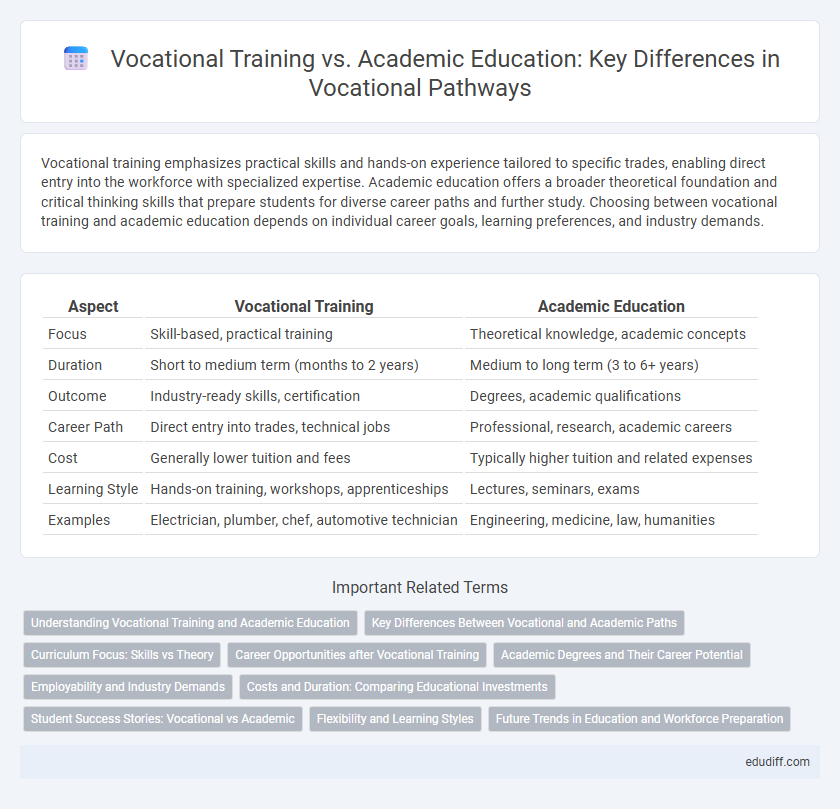Vocational training emphasizes practical skills and hands-on experience tailored to specific trades, enabling direct entry into the workforce with specialized expertise. Academic education offers a broader theoretical foundation and critical thinking skills that prepare students for diverse career paths and further study. Choosing between vocational training and academic education depends on individual career goals, learning preferences, and industry demands.
Table of Comparison
| Aspect | Vocational Training | Academic Education |
|---|---|---|
| Focus | Skill-based, practical training | Theoretical knowledge, academic concepts |
| Duration | Short to medium term (months to 2 years) | Medium to long term (3 to 6+ years) |
| Outcome | Industry-ready skills, certification | Degrees, academic qualifications |
| Career Path | Direct entry into trades, technical jobs | Professional, research, academic careers |
| Cost | Generally lower tuition and fees | Typically higher tuition and related expenses |
| Learning Style | Hands-on training, workshops, apprenticeships | Lectures, seminars, exams |
| Examples | Electrician, plumber, chef, automotive technician | Engineering, medicine, law, humanities |
Understanding Vocational Training and Academic Education
Vocational training equips students with practical skills tailored for specific trades or professions, emphasizing hands-on experience and job readiness. Academic education focuses on theoretical knowledge and critical thinking across a broad range of subjects, preparing students for higher education and research. Both pathways offer distinct advantages: vocational training accelerates entry into the workforce, while academic education fosters comprehensive intellectual development.
Key Differences Between Vocational and Academic Paths
Vocational training emphasizes practical skills and hands-on experience directly related to specific trades, enabling faster entry into the workforce with targeted expertise. Academic education prioritizes theoretical knowledge and critical thinking, preparing students for a broader range of professional and scholarly careers. The key differences lie in their learning approaches, duration, cost, and career outcomes, with vocational paths typically offering shorter, more affordable programs linked to immediate employment opportunities.
Curriculum Focus: Skills vs Theory
Vocational training emphasizes practical skills development tailored to specific trades or industries, enabling learners to gain hands-on experience and job-ready competencies. Academic education centers on theoretical knowledge and conceptual understanding, fostering critical thinking and broad intellectual growth. This curriculum distinction directs vocational students towards immediate employment opportunities, while academic pathways prepare individuals for further study or research-based careers.
Career Opportunities after Vocational Training
Vocational training equips individuals with specific skills tailored for industries such as healthcare, technology, and skilled trades, resulting in faster entry into the workforce compared to academic education. Graduates of vocational programs often experience higher employment rates and immediate hands-on opportunities in specialized careers like electrician, plumber, or medical technician. These targeted career paths benefit from strong industry demand, higher job stability, and competitive salaries within shorter training periods.
Academic Degrees and Their Career Potential
Academic degrees in fields such as engineering, medicine, and law often provide specialized knowledge and theoretical foundations that open doors to professional careers with high earning potential. Vocational training offers hands-on skills tailored to specific trades, which can lead to quicker employment but may lack the broad career advancement opportunities that academic degrees frequently offer. Career growth and salary prospects typically correlate with the level of academic qualification attained, making degrees a critical factor in long-term professional development.
Employability and Industry Demands
Vocational training offers practical skills and industry-specific knowledge that directly align with current job market demands, enhancing immediate employability. Academic education provides theoretical foundations and critical thinking skills but may lack the hands-on experience preferred by many employers. Employers increasingly prioritize candidates with vocational qualifications for roles requiring specialized technical expertise and adaptable workforce readiness.
Costs and Duration: Comparing Educational Investments
Vocational training typically requires a shorter duration, ranging from a few months to two years, compared to academic education which often spans three to four years or more, offering a quicker path to employment. The cost of vocational programs is generally lower due to reduced tuition fees and fewer associated expenses, making it a more affordable educational investment for many students. This difference in time and financial commitment makes vocational education an attractive option for those seeking efficient skill acquisition and rapid entry into the workforce.
Student Success Stories: Vocational vs Academic
Vocational training has empowered students like Maria, who secured a high-paying job as an electrician within six months, showcasing practical skill application that often leads to immediate employment. Academic education graduates such as James have demonstrated success through research roles and advanced studies, highlighting the value of theoretical knowledge and critical thinking. These success stories emphasize that both pathways offer unique advantages tailored to diverse career goals and industry demands.
Flexibility and Learning Styles
Vocational training offers flexible, hands-on learning tailored to practical skill development, accommodating kinesthetic and experiential learners effectively. Academic education primarily emphasizes theoretical knowledge with structured schedules, favoring auditory and visual learning styles. Flexibility in vocational programs allows for part-time, on-the-job, and modular courses, making them accessible for diverse learning preferences and career timelines.
Future Trends in Education and Workforce Preparation
Vocational training is increasingly aligned with emerging industry demands, emphasizing hands-on skills and real-world experience that enhance workforce readiness in rapidly evolving sectors like technology and healthcare. Academic education continues to provide critical theoretical foundations, but integration with vocational elements through hybrid models is shaping future education trends for more adaptable skill sets. Data from labor market analyses suggest that graduates equipped with both practical expertise and academic knowledge consistently achieve higher employment rates and career advancement opportunities.
Vocational Training vs Academic Education Infographic

 edudiff.com
edudiff.com